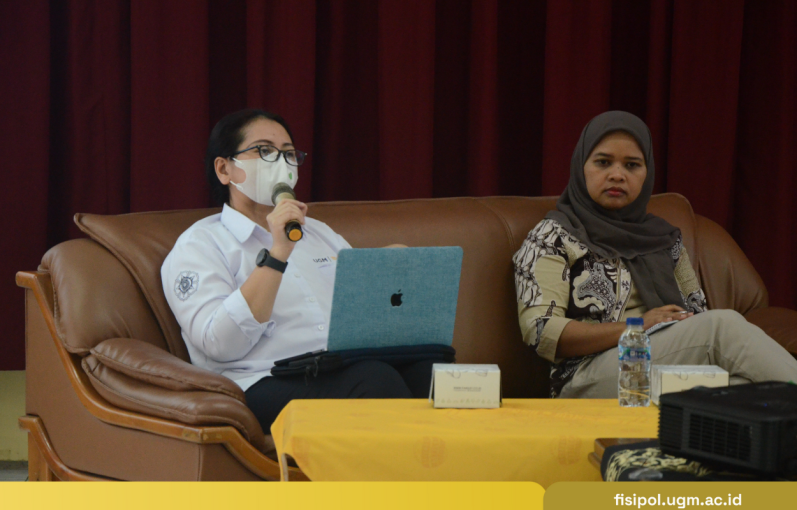
Yogyakarta, November 4th 2024─Energy transition has been raised as an international agenda to deal with climate change issues. Although various efforts have been made to encourage the acceleration of the national energy transition, the big concept of Green Transition itself creates a paradox. Prof. Dr. Poppy Sulistyaning Winanti, S.IP., M.PP., Lecturer of the Department of International Relations UGM with Dr. Nanang Indra Kurniawan, S.IP., MPA, Lecturer of the Department of Politics and Government of UGM reviewed the topic in a discussion on Monday (4/11).
Under the theme “Recarbonization through Decarbonization: How Green Extraction Deepens Fossil Fuel Dependence”, Poppy explained that the big picture of the energy transition has not completely avoided fossil energy. “Efforts to reduce carbon emissions use green energy. Then the electric car industry emerged, the most needed is the battery. Components to make batteries, until electricity as the main energy source, cannot be renewed,” Poppy explained.
The manufacture of battery raw materials or components in renewable energy technology uses many critical minerals. These types of raw materials including nickel, cobalt, lithium, manganese, and others are increasingly targeted due to the soaring demand for new renewable energy technologies. Clean energy technologies require more mineral content in the manufacturing process than fossil fuel technologies. Lithium, for example, is essential in the manufacture of batteries for electric cars.
“The dream of this energy transition gives rise to the exquisite extractive. Extraction that is deeper, stronger and more entrenched. This is evidenced by the high demand for minerals from other countries,” Poppy added. Indonesia as a country blessed with an abundance of natural resources plays an important role in the availability and needs of international minerals.
The government clearly states that it wants to increase the downstreaming of critical mineral products, especially nickel. Through the 2020 Minister of Energy and Mineral Resources Regulation, nickel ore with a grade below 1.7% may not be exported. Instead, it must be processed domestically, so that its value increases. This policy was introduced in response to the high demand for Indonesia’s nickel ore exports and the drive for industrialization. However, both increase the intensity of domestic mining.
Nanang Indra Kurniawan, explains why fossil dependency is difficult to break. “Our nickel is cheap and plentiful. Renewable energy development will not be possible without mining. This causes a higher dependence on fossil fuels. They don’t disappear, but they add to the composition of society,” said Nanang. The mineral extraction process is inseparable from the use of fossil fuels such as coal. This is the reason why the fossil industry is still relevant today, as they are not only used as fuel.
In addition, the world’s infrastructure is built using fossil energy systems. Steam power plants, for example, still use coal to produce steam that is converted into electricity. The trapping of carbon in infrastructure is referred to as the Carbon Lock-in phenomenon. “Changing the system is very difficult and requires a lot of money, so we cannot completely escape from mining,” Nanang explained.
Nanang added that another thing that supports the sustainability of fossil energy is the actors connected to the fossil business. Currently, almost all players in the coal business are political elites. Nanang said there was an effort to maintain the coal industry through political lock-in. The government itself encourages the acceleration of the national energy transition, but also encourages the use of mining materials in the process. Then this is referred to as a unity of the green transition process.
“We need to reorganize the framework of how the green transition is actually implemented. Energy transition is not a technical matter. Not making technical investments, but encouraging more democratic political relations,” Nanang concluded. The discussion “Recarbonization through Decarbonization: How Green Extraction Deepens Fossil Fuel Dependence” is one of the Faculty’s contributions in realizing the 13th Sustainable Development Goals (SDGs), namely Climate Change Management.
